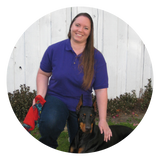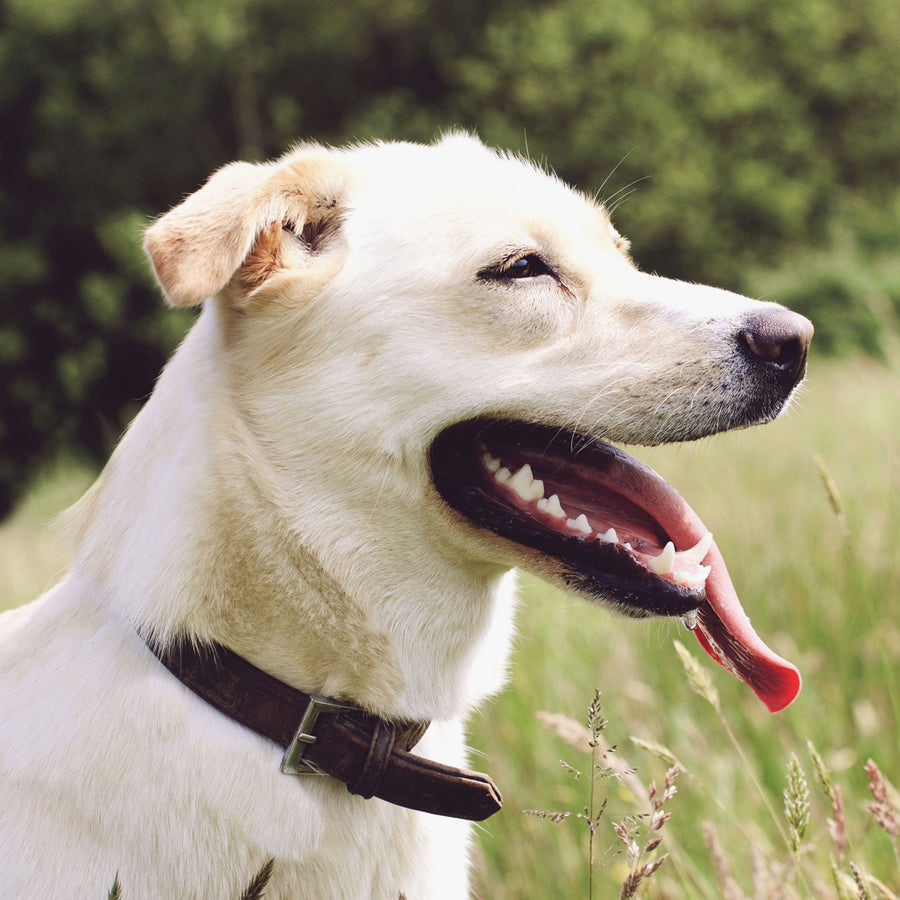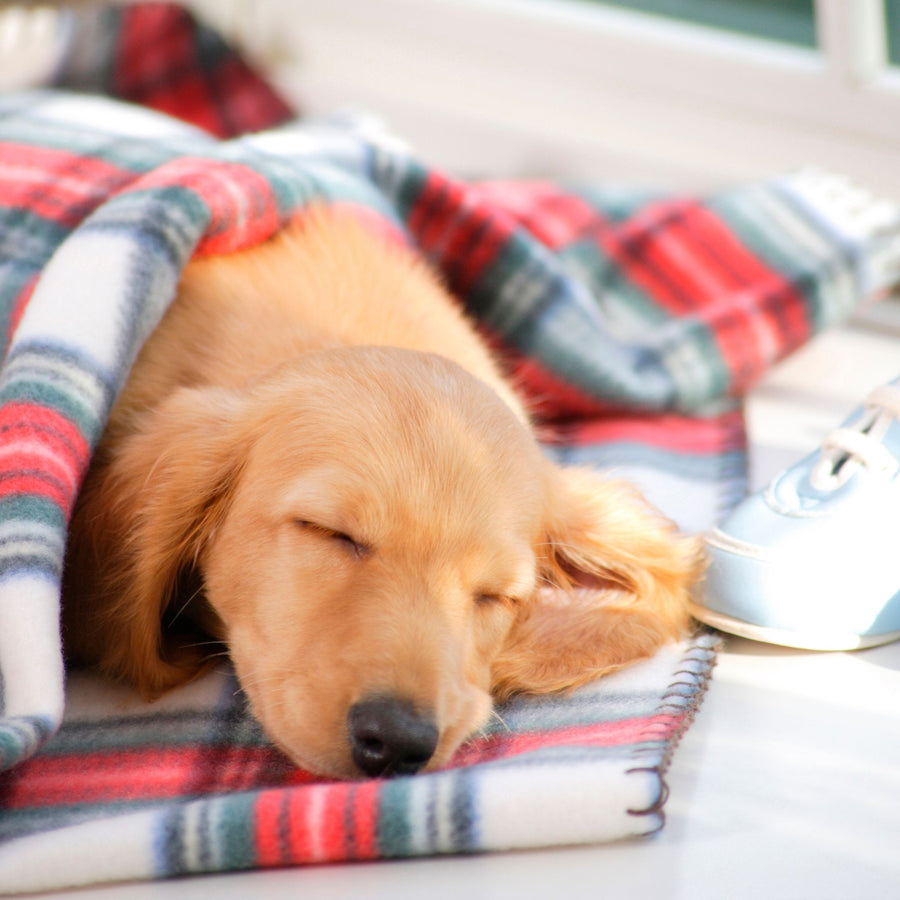Dogs Need Naps Too

That's right. Your bundle of furry joy can get overtired and cranky. What do dogs do when they need a nap? Destroy stuff. Nip. Bark. Jump up. Zoom around. Act as though they are possessed. It runs the gambit. Your job is to preempt overtired-doggie-meltdowns and have a relaxation regiment in place for them. We will walk you through how to do just that in this blog post.
ROUTINES ARE YOUR FRIENDS
Dogs crave predictability, schedules and routines.
Look at your schedule and figure out a few key things:
When does your dog wake up in the morning to start the day?
When do they eat their meals?
When are they playing?
When do they go bed for the night?
When does it seem as though they lose their ever-loving mind?
Try to be consistent with your schedule, but realize that dogs are smart little creatures. For instance, if you feed breakfast at 6:30AM, your dog will ask at some point that you feed them at 6:00AM instead. Hold your ground, waiting the extra half hour is not going to kill them. Utilizing management tools such a gates, x-pens and crates can help set your dog up for success.
Once you have your routine pretty much figured out, you can work in exercises to help avoid pushing your dog into cranky-crazy-mode.
BE PROACTIVE, NOT REACTIVE
The more you can head issues off at the pass, the better it will be for you.
So, let's say that your dog tends to get super amped up around 8:00PM at night.
What to do, what to do?!
It's pretty simple when you think about it: do a quick training session at 7:30PM for 10-15 minutes, followed by a relaxation exercise and conclude with an opportunity for them to chew.
"...That sounds too simple."
Simplicity is a beautiful thing.
There is a multitude of reasons why your dog may be running amok at 8PM. It could be that they didn't do enough that day. It could also be that they did TOO much that day (we'll talk about that in a minute). Regardless of the cause, your dog needs an outlet. They need your help! Doing a quick training session, followed by a relaxation exercise and concluding with an opportunity to chew is a great way to do just that.
"Okay...but what should I be training?"
Anything that is more mentally-stimulating than physically stimulating.
You want your dog to be tapping into their mental calories, not kicking their adrenaline into high-gear.
So activities such as a shaping, precision work that is typical of obedience or rally, even short Scent Work sessions can work really well. High-octane activities such as agility, flyball or disc dog are probably not the best option.
"Alright, I think that makes sense. But what is this relaxation exercise you speak of?"
Mat work. Having your dog truly settle while laying on a mat. Following Dr. Karen Overall's Relaxation Protocol is a personal favorite of mine, whether it be following it to the letter or using it as a launching off point.
You can also incorporate breathing exercises and massage into your relaxation routine. Getting your hands on your dog to make that connection is a skill we seemed to have lost as a community.
"But what about this chewing thing...why do I need to do that?"
Have you ever watched a dog chew? I mean REALLY watch them?
Firstly, the way chewing activates all of the muscles in their face, head and neck.
Then their overall facial expression. They seem to go into a sort of trance when they are chewing. Chewing appears to be an extremely Zen thing for dogs to do. What a great way to end the day!
BAKING IN INSANITY
This next part may be difficult to hear, but it is important nonetheless.
It is entirely possible you are baking in a propensity for your dog to be insane with what you do with them and how often.
"WHAT?!"
Hear me out.
Many of us are dabbling in multiple dog sports at any given time. We may be taking formal in-person classes or online courses, or a combination of the two. For instance, maybe your week looks something like this: Agility and Parkour on Monday. Scent Work and Tracking on Tuesday. Barn Hunt on Wednesday. Rally and Obedience on Thursday. Then we do some fine-tuning to prepare for whichever dog sport we are competing in on Friday. Trial over the weekend. Rinse and repeat.
"...So?"
This routine is go, go and more go!
But, what if you or your dog gets hurt? Maybe something else pops up where you cannot do all of this all of the time? Weather changes preventing you from leaving the house. Your instructor goes on vacation. Your car breaks down. You get the point.
You've essentially been conditioning your dog to be an Olympic-level athlete who can never be satiated and they are busting out of their skin!
"You're saying I shouldn't be doing all this stuff? But I love my classes and training!"
No, you misunderstand me. I love that you are doing all of this with your dog! What I'm suggesting is the need to inject some balance into your routine.
Just as we designed a 7:30PM routine with your dog to be proactive and preempt them from losing their mind at 8:00PM, you should take that same approach on a more global scale.
"Huh?"
Really analyze your schedule. Both on a microlevel (what you are doing every day and every hour of that day) and a macrolevel (what are you doing in a given week and month).
Where are those breaks and relaxation sessions?
Are you scheduling rest days where your dog can just lounge around and be a dog? Something along the lines of going on a chill walk or hike where they can sniff, explore and set the pace.
Which category does the vast majority of your activities fall into: mental stimulation or physical stimulation? I would urge you to lean more toward mental stimulation.
It's crucially important that you give your dog an opportunity to rest, both mentally and physically. Doing so will help avoid burnout and prevent you from inadvertently pushing your pup into a territory where they are over-aroused and cranky.
OFF-SWITCH DOESN'T EXIST? DEVELOP ONE
One of the common trends I've noticed as a professional dog trainer over the years is the fact that many dogs lack a natural off-switch. Even my first Doberman, Zeus, had a difficult time relaxing. We would have massage sessions and as soon as he would begin to soften and "noodle", as I liked to call it, he would stiffen up and go back on alert. "I'm going to lose my Doberman-license if I relax!", he seemed to say. It took literal months for him to finally learn how to fully relax in those sessions. It was a skill he did not have naturally and he had to learn. A skill that was crucial in his behavior modification work and improving his overall quality of life.
However, Zeus was not an anomaly. Whether it be my group classes or private lessons, time and time again I encountered dogs who naturally seemed to lack all concept of what an off-switch was.
If you think your dog is also lacking a natural off-switch, you may want to look into our Find Your Dog's Off-Switch Webinar.
At the end of the day, we need to remember that are our dogs are not robots or machines. They become physically and mentally drained, just like we do. Think of when you've been asked to do too much at work, there is an overabundance of family drama or you simply have too much to do. You become drained, exhausted, cranky and irritable. Our dogs are no different.
With that in mind, give your dog an opportunity to rest, nap and recover from all you do with them. This can mean that sometimes you have to purposefully help them, by setting up nap sessions, placing them in an x-pen, crate or another room with a chew and so on.
Learning to settle and not having to be "ON" all the time is something every single dog would benefit from. Find ways you can introduce this concept with your dog. Your performance in the ring, and your life at home, will greatly benefit from it.

Dianna has been training dogs professionally since 2011. She has done everything from teaching group training classes and private lessons, to specializing in working with fearful, reactive and aggressive dogs, to being a trial official and competition organization staff member.
Following a serious neck and back injury, Dianna was forced to retire from in-person dog training. But she was not ready to give up her passion! So, she created Pet Dog U and Scent Work University to provide outstanding online dog training to as many dog handlers, owners and trainers possible…regardless of where they live! Dianna is incredibly grateful to the amazingly talented group of instructors who have joined PDU and SWU and she looks forward to the continued growth of PDU and SWU and increased learning opportunities all of these online dog training platforms can provide.
In June 2021, Dianna and her business partner, Sean McMurray launched Cyber Scent Work, Inc., an organization that operates in the gray space between training and trialing in Scent Work. With Cyber Scent Work, Inc., handlers have the opportunity to earn Qs, titles and ribbons while also receiving helpful training advice regardless of whether they qualify or not! Be sure to check out Cyber Scent Work, Inc., you will be happy you did!
#petdogublog #pupnaps #doggienaps #puppynaps #playwithyourdog #dogsports #traindogsports #dogownership #puppyownership #dogowners #dogs #puppies #dogtraining #dogtrainers #dogtraininginstructors #doginstructors #petdogu

